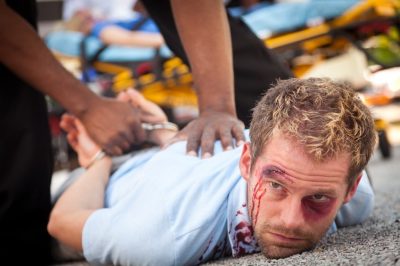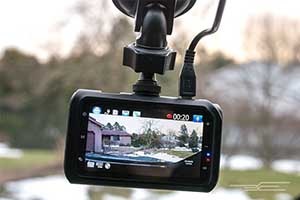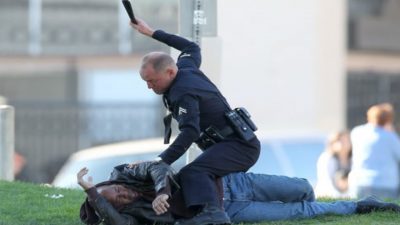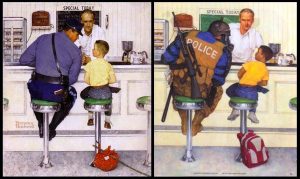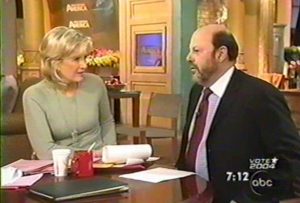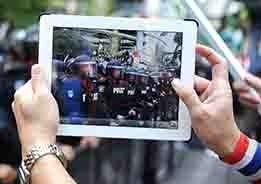
The United States Supreme Court has never decided the issue of whether persons have a Constitutional Right to Record the Police, and on February 20, 2018 that court decided not to decide that issue.
All of the United States Courts of Appeals that have decided that issue have held that you do have a First Amendment right to audio or video record the police. The only exception is the United States Court of Appeals for the Eighth Circuit, that held that although one may have a right to record the police in public, that there is no Constitutional Right to Record the Police in the lobby of a police station. See, Akins v. Knight, Case No. 16-3555 (8th Cir. 2017). The U.S. Supreme Court denied review of Akins on February 20, 2018.
Those federal Circuit Courts of Appeals that have not actually decided whether there is a First Amendment right to record the police, had awarded the police “qualified immunity” from federal claims against them in civil rights cases.
The United States Department of Justice has for some time now has officially taken the position that you have a First Amendment right to record the police. See, Christopher Sharp v. Baltimore City Police Department, et. al., letter from United States Department of Justice letter of May 14, 2012 stating:
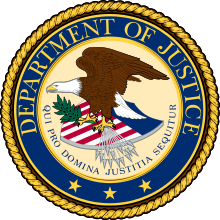
“Recording governmental officers engaged in public duties is a form of speech through which private individuals may gather and disseminate information of public concern, including the conduct of law enforcement officers. See, e.g., Glik v. Cunniffe, 655 F.3d 78, 82 (1st Cir. 2011) (“[b]asic First Amendment principles” and federal case law “unambiguously” establish that private individuals possess “a constitutionally protected right to videotape police carrying out their duties.”); Smith v. Cumming, 212 F.3d 1332, 1333 (11th Cir. 2000) (recognizing the “First Amendment right . . . to photograph or videotape police conduct.”); Fordyce v. City of Seattle, F.3d 436, 439 (9th Cir. 1995) (recognizing the “First Amendment right to film matters of public interest”). The First Amendment right to record police activity is limited only by “reasonable time, place, and manner restrictions.” Glik, 655 F.3d at 84; Smith, 212 F.3d at 1333.
While courts have only recently begun to refine the contours of the right to record police officers, the justification for this right is firmly rooted in long-standing First Amendment principles. The right to “[g]ather[] information about government officials in a form that can readily be disseminated to others serves a cardinal First Amendment interest in protecting and promoting ‘the free discussion of governmental affairs.’” Glik, 655 F.3d at 82 (citing Mills v. Alabama, 384 U.S. 214, 218 (1966)). The application of this right to the conduct of law enforcement officers is critically important because officers are “granted substantial discretion that may be used to deprive individuals of their liberties.” Id.; Gentile v. State Bar of Nev., 501 U.S. 1030, 1035-36 (1991) (“Public awareness and criticism have even greater importance where, as here, they concern allegations of police corruption.”).
The “extensive public scrutiny and criticism” of police and other criminal justice system officials serves to “guard[] against the miscarriage of justice,” Nebraska Press Association v. Stuart, 427 U.S. 539, 560 (1976) (citing Sheppard v. Maxwell, 384 U.S. 333, 350 (1966)), a harm that undermines public confidence in the administration of government. When police departments take affirmative steps to protect individuals’ First Amendment rights, departments “not only aid[] in the uncovering of abuses . . . but also may have a salutary effect on the functioning of government more generally.” Glik, 655 F.3d at 82-83.”
YOUR RIGHT TO RECORD IN THE WESTERN STATES.
Just because the Ninth Circuit Court of Appeals has held that one has a First Amendment right to record the police, that doesn’t mean that California police officer still don’t arrest civilians for doing just that.
In California, the police were unconstitutionally arresting so many people for recording them that the California legislature had to literally spell-out for California peace officers that they cannot arrest a civilian for recording their conduct. They did this by amending Cal. Penal Code § 148(a)(1) (Resisting / Obstructing / Delaying a Peace Officer), and Cal. Penal Code § 69 (using or threatening use of force upon officer to prevent or deter them from performing duties) by adding Cal. Penal Code § 148(g) that states:
Cal. Penal Code § 148(g) provides:
“The fact that a person takes a photograph or makes an audio or video recording of a public officer or peace officer, while the officer is in a public place or the person taking the photograph or making the recording is in a place he or she has the right to be, does not constitute, in and of itself, a violation of subdivision (a), nor does it constitute reasonable suspicion to detain the person or probable cause to arrest the person.”
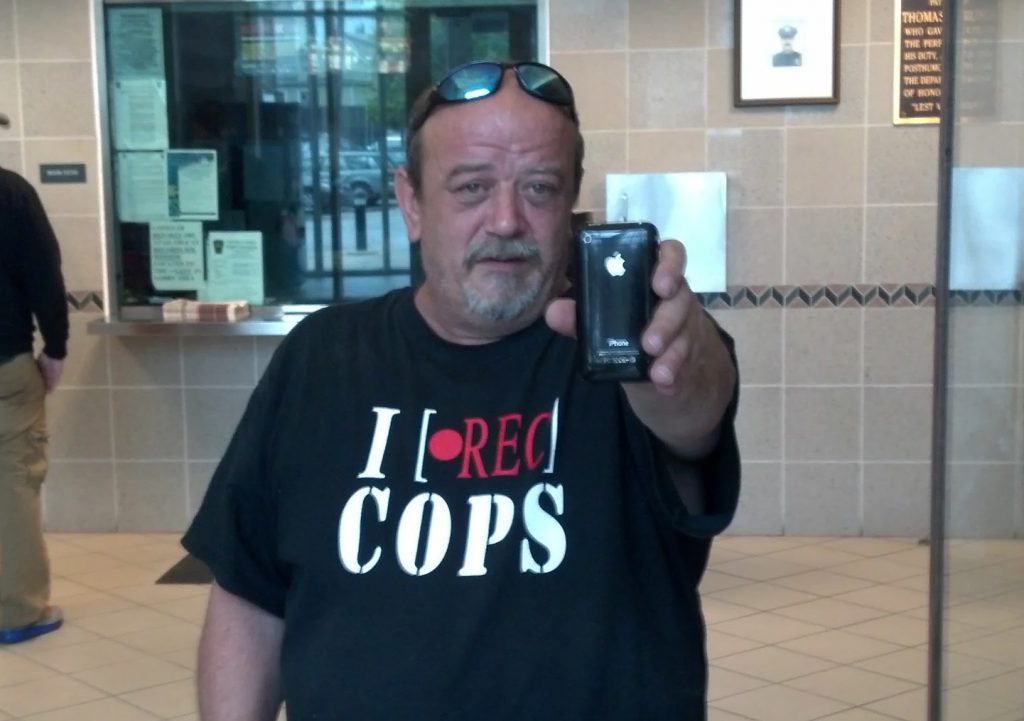 That means that in the geographical territory of those federal judicial appellate circuits that have decided that you have such a First Amendment right (i.e. United States Court of Appeals for the 1st, 3rd, 4th, 7th, 9th and 11th Circuits), you have a clearly established right to record the police. See, (First Circuit Court of Appeals) Glik v. Cunniffe, 655 F.3d 78 (1st Cir. 2011) and Gericke v. Begin, 753 F.3d 1, 7 (1st Cir. 2014), (Third Circuit Court of Appeals) Fields v. City of Philadelphia, 862 F.3d 353 (2017), (Seventh Circuit Court of Appeals) ACLU of Illinois v. Alvarez, 679 F.3d 583 (7th Cir. 2012), (Ninth Circuit Court of Appeals) Fordyce v. City of Seattle, 55 F.3d 436, 439 (9th Cir. 1995) and (Eleventh Circuit Court of Appeals) Smith v. City of Cumming, 212 F.3d 1332, 1333 (11th Cir. 2000) .
That means that in the geographical territory of those federal judicial appellate circuits that have decided that you have such a First Amendment right (i.e. United States Court of Appeals for the 1st, 3rd, 4th, 7th, 9th and 11th Circuits), you have a clearly established right to record the police. See, (First Circuit Court of Appeals) Glik v. Cunniffe, 655 F.3d 78 (1st Cir. 2011) and Gericke v. Begin, 753 F.3d 1, 7 (1st Cir. 2014), (Third Circuit Court of Appeals) Fields v. City of Philadelphia, 862 F.3d 353 (2017), (Seventh Circuit Court of Appeals) ACLU of Illinois v. Alvarez, 679 F.3d 583 (7th Cir. 2012), (Ninth Circuit Court of Appeals) Fordyce v. City of Seattle, 55 F.3d 436, 439 (9th Cir. 1995) and (Eleventh Circuit Court of Appeals) Smith v. City of Cumming, 212 F.3d 1332, 1333 (11th Cir. 2000) .
WHEN AM I CONSIDERED TO BE “RECORDING” THE POLICE, AS OPPOSED TO “INTERFERING” WITH THE POLICE.
As a general proposition, a person may record public police activity unless the person engages in actions that jeopardize the safety of the officer, the suspect, or others in the vicinity, violate the law, or incite others to violate the law. See, e.g., Chaplinsky v. New Hampshire, 315 U.S. 568, 573 (1942) (words “likely to result in an immediate violent reaction, “fighting words]” are not afforded First Amendment protection, unless uttered to peace officer); see also Louisiana ex rel. Gremillion v. National Ass’n for the Advancement of Colored People, 366 U.S. 293, 297 (1961) (“criminal conduct . . . cannot have shelter in the First Amendment” [i.e. “This is a stick-up. Hand over the money”[).
Courts have held that speech is not protected by the First Amendment if it amounts to actual obstruction of a police officer’s investigation – for example, by tampering with a witness or persistently engaging an officer who is in the midst of his or her duties. See Colten v. Commonwealth of Kentucky, 407 U.S. 104 (1972) (individual’s speech not protected by the First Amendment where individual persistently tried to engage an officer in conversation while the officer was issuing a summons to a third party on a congested roadside and refused to depart the scene after at least eight requests from officers); King v. Ambs, 519 F.3d 607 (6th Cir. 2008) (individual was not engaged in protected speech when he repeatedly instructed a witness being questioned by a police officer not to respond to questions.
However, the Supreme Court has held several times that mere verbal protest or verbal challenge of police orders and actions are also protected by the First Amendment. See, City of Houston v. Hill, 482 U.S. 451 (1987), Courts have held that speech is not protected by the First Amendment if it amounts to actual obstruction of a police officer’s investigation – for example, by tampering with a witness or persistently engaging an officer who is in the midst of his or her duties. See, Colten v. Commonwealth of Kentucky, 407 U.S. 104 (1972) (individual’s speech not protected by the First Amendment where individual persistently tried to engage an officer in conversation while the officer was issuing a summons to a third party on a congested roadside and refused to depart the scene after at least eight requests from officers); King v. Ambs, 519 F.3d 607 (6th Cir. 2008) (individual was not engaged in protected speech when he repeatedly instructed a witness being questioned by a police officer not to respond to questions.
FIRST AMENDMENT ROOTS OF THE RIGHT TO RECORD THE POLICE IS TENUOUS.
Recording governmental officers engaged in public duties is a form of speech through which private individuals may gather and disseminate information of public concern, including the conduct of law enforcement officers. See, Glik v. Cunniffe, 655 F.3d 78, 82 (1st Cir. 2011). The First Amendment protects the public’s right of access to information about their officials’ public activities. It “goes beyond protection of the press and the self – expression of individuals to prohibit government from limiting the stock of information from which members of the public may draw.” First Nat’l. Bank of Bos. v. Bellotti, 435 U.S. 765, 783 (1978).
Access to information regarding public police activity is particularly important because it leads to citizen discourse on public issues, “the highest rung of the hierarchy of First Amendment values, and is entitled to special protection.” Snyder v. Phelps, 562 U.S. 443, 452 (2011) (quoting Connick v. Myers, 461 U.S. 138, 145 (1983)); Garrison v. Louisiana, 379 U.S. 64, 77 (1964) (recognizing the “paramount public interest in a free flow of information to the people concerning public officials, their servants”). Recording governmental officers engaged in public duties is a form of speech through which private individuals may gather and disseminate information of public concern, including the conduct of law enforcement officers. See, Glik v. Cunniffe, 655 F.3d 78, 82 (1st Cir. 2011).
The First Amendment protects the public’s right of access to information about their officials’ public activities. It “goes beyond protection of the press and the self – expression of individuals to prohibit government from limiting the stock of information from which members of the public may draw.” First Nat’l. Bank of Bos. v. Bellotti, 435 U.S. 765, 783 (1978). Access to information regarding public police activity is particularly important because it leads to citizen discourse on public issues, “the highest rung of the hierarchy of First Amendment values, and is entitled to special protection.” Snyder v. Phelps, 562 U.S. 443, 452 (2011) (quoting Connick v. Myers, 461 U.S. 138, 145 (1983)); Garrison v. Louisiana, 379 U.S. 64, 77 (1964) (recognizing the “paramount public interest in a free flow of information to the people concerning public officials, their servants”).
Accordingly, at least for the time being, you cannot be arrested for recording the police unless you are so close or are doing something else that meaningfully interferes with lawful police action.
WHAT TO DO.
If you have been the victim of Police Misconduct, we can help. Please also see:
What To Do If You Have Been Beaten-Up or Falsely Arrested By The Police
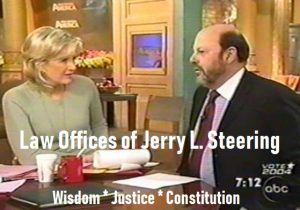
Jerry L. Steering, Esq., Law Office of Jerry L. Steering, 4063 Birch Street, Suite 100, Newport Beach, CA 92660; Tel: (949) 474-1849; email: jerrysteering@yahoo.com

